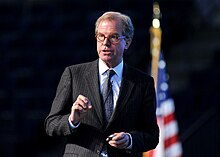Nicholas Negroponte
American computer scientist
Nicholas Negroponte (born 1 December 1943) is a Greek-American computer scientist best known as founder and director of Massachusetts Institute of Technology's Media Lab.

Quotes
edit- Scale will get you strategy.
- Think of it: the lowest common denominator in being digital is not your operating system, modem, or model of computer. It's a tiny piece of plastic, designed decades ago by Bell Labs' Charles Krumreich, Edwin Hardesty, and company, who thought they were making an inconspicuous plug for a few telephone handsets. Not in their wildest dreams was Registered Jack 11 — a modular connector more commonly known as the RJ-11 — meant to be plugged and unplugged so many times, by so many people, for so many reasons, all over the world.
- RJ-11 [1].
- Young people, I happen to believe, are the world's most precious natural resource.
- Pricing the Future [2].
- You can see the future best through peripheral vision.
- Foreword of Unleashing the Killer App: Digital Strategies for Market Dominance (Harvard Business School Press, Revised edition March 2000) ISBN 1578512611.
- Think about it. Turning pages. How ridiculous that is. It's just unbelievably dumb. … [Apple's] building peripherals for iTunes … We can't turn these kids into couch potatoes.
- Mobilize 2010: Negroponte Sees Tablets as Creative Tool in Gigaom (30 September 2010).
- MIT is governed by a second, even higher rule: the inalienable right of academic freedom.
- The Internet for us was like air. It was there all the time — you wouldn't notice it existed unless it was missing.
- I've spent my whole life worrying about the human-computer interface, so I don't want to suggest that what we have today is even close to acceptable.
- I think the Net is scaling very well. Because of the way it was designed, I don't think it will come to its knees and crash. I see it as very organic in the way it's capable of living and reproducing itself.
- Cyberlaw is global law.
- Unlike television — at least as it currently exists — the Internet is a medium of choice.
- If you think about it, being digital is Italian. It's underground, provocative, interactive. It has humor, discourse, and debate. It has a kind of liveliness to it.
Being Digital (1995)
edit- The change from atoms to bits is irrevocable and unstoppable. Why now? Because the change is also exponential — small differences of yesterday can have suddenly shocking consequences tomorrow.
- True personalization is now upon us. It's not just a matter of selecting relish over mustard once. The post-information age is about acquaintance over time: machines' understanding individuals with the same degree of subtlety (or more than) we can expect from other human beings, including idiosyncrasies (like always wearing a blue-striped shirt) and totally random events, good and bad, in the unfolding narrative of our lives.
- Personal computers will make our future adult population simultaneously more mathematically able and more visually literate. Ten years from now, teenagers are likely to enjoy a much richer panorama of options because the pursuit of intellectual achievement will not be tilted so much in favor of the bookworm, but instead cater to a wider range of cognitive styles, learning patterns, and expressive behaviors.
A 30-year history of the future, TED Talk (2014)
edit- When you write a computer program you've got to not just list things out and sort of take an algorithm and translate it into a set of instructions. But when there's a bug — and all programs have bugs — you've got to debug it. You've got to go in, change it, and then re-execute … and you iterate. And that iteration is really a very, very good approximation of learning.
- Nicholas Negroponte: A 30-year history of the future, July 2014, TED Talks (about 13:40 into 19:43 video).
Attributed
edit- Isn't it odd how parents grieve if their child spends six hours a day on the 'Net, but are delighted if those same hours are spent reading books?